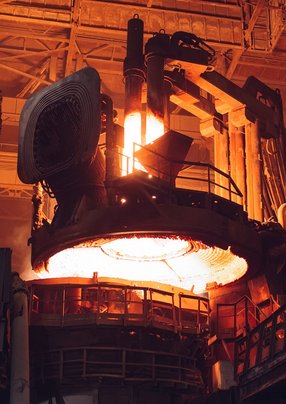
Frederik Esterhuizen: Green Steel at ABB Address Scope 3

Frederik Esterhuizen, Global Business Line Manager for Metals at ABB’s Process Industries division, is at the forefront of the transition toward sustainable steel and aluminium production.
With extensive cross-industry experience, Frederik focuses on equipping teams with the skills, adaptability and vision required to meet the challenges of a rapidly evolving sector. “This collaborative approach helps us deliver value-driven solutions that address today’s demands while aligning with tomorrow’s environmental ambitions,” he shares.
Green Steel: Lowering carbon footprints across supply chains
“The shift to low-carbon steel production is a critical opportunity for reducing carbon emissions in industries that rely heavily on steel,” says Frederik. The steel industry accounts for 7-9% of global CO₂ emissions, a significant share comparable to mining and cement.
Innovative production methods, such as electric arc furnaces and hydrogen-based direct reduced iron, are crucial for reducing the carbon intensity of steel products.
Frederik notes that these advancements can significantly reduce Scope 3 emissions for downstream businesses sourcing low-carbon steel.
“Global steel demand is projected to rise by 30% by 2050, highlighting the importance of making low-carbon steel available to meet future demand while staying within climate targets,” he explains. Companies like Volvo Group, which has already integrated fossil-free steel into its production, demonstrate the feasibility of such efforts.
However, challenges persist. “As production ramps up, supply constraints and higher costs associated with green steel could disrupt existing supply chains in the near term,” Frederik warns. Collaboration with steel producers is vital to ensure traceability and access to low-carbon steel, enabling accurate Scope 3 emissions accounting and fully realising the benefits of the transition.
Overcoming challenges for downstream businesses
These early stages of transitioning to Green Steel present hurdles for downstream industries. “Availability will likely be limited initially as efforts to scale production increase,” Frederik explains.
The scarcity may drive up prices and lead to continued reliance on traditional steelmaking processes, slowing progress toward sustainability goals.
The financial implications are equally significant. “The estimated upfront capital costs for decarbonising steel production could reach US$4.4tn, with production costs potentially being 30% higher than they are today,” Frederik notes. The pressures could impact margins and competitiveness as manufacturers incorporate greener materials.
Traceability is another critical challenge. Frederik highlights, “Reliable tracking of Green Steel through complex supply chains is essential for accurate Scope 3 emissions reporting.” Without clear data on carbon intensity, businesses risk gaps in reporting that could undermine sustainability credentials.
To address these issues, ABB is leading by example. “We’ve taken proactive steps to reduce our carbon footprint by sourcing low-carbon copper for technologies like electromagnetic stirrers,” Frederik shares. The approach provides a blueprint for downstream industries to prioritise verified, low-carbon materials in their supply chains. “A partnership-driven approach paired with rigorous tracking is essential for achieving sustainability goals in the Green Steel transition,” he asserts.
Collaborating across the value chain
Partnerships are pivotal in advancing decarbonisation efforts. Frederik points to Sweden’s HYBRIT initiative, a collaboration between SSAB, LKAB, and Vattenfall, producing the world’s first fossil-free steel. Early adopters like Volvo Group have incorporated this steel into production, setting a powerful example.
The financial sector is playing a significant role. “The Institutional Investors Group on Climate Change (IIGCC), representing more than US$55tn in assets, is driving sustainable financing for the steel industry,” Frederik explains. Such commitments are pushing manufacturers to prioritise sustainable sourcing.
Frederik envisions broader collaborations involving recyclers, energy firms, and policymakers. “Achieving systemic change requires a shared vision, knowledge exchange, and co-development across the value chain,” he highlights. Partnerships are key to creating a circular steel ecosystem that supports the global sustainability push.
Frederik’s leadership exemplifies the collaborative effort required to navigate Green Steel's challenges and opportunities. ABB is helping industries transition to a sustainable future by driving innovation and fostering partnerships.
Make sure you check out the latest industry news and insights at Scope 3 Magazine and be part of the conversation at our global conference series, Sustainability LIVE and Procurement & Supply Chain LIVE.
Discover all our upcoming events and secure your tickets today. Subscribe to the Scope 3 Magazine newsletter.
Scope 3 Magazine is a BizClik brand.
- Nissan Expands Green Steel to cut Scope 3 EmissionsSupply Chain Sustainability
- Maersk Sustainability Reporting: Navigating Scope 3Transportation & Logistics
- SHEIN’s Scope 3 Emissions: Fast Fashion’s Carbon BurdenCircular Economy
- Tackling Super Bowl LIX's Scope 3 Emissions ChallengeScope 1 2 and 3
Featured Articles
Estonia, Latvia and Lithuania join the European grid, cutting ties with Russian energy, a move that boosts regional security and sustainability
TÜV SÜD: New battery regulations bring Scope 3 hurdles, requiring sustainable sourcing, digital traceability and design changes increasing compliance
Nissan is scaling up its use of green steel, reducing CO2 emissions in its supply chain as part of its goal to achieve carbon neutrality by 2050

